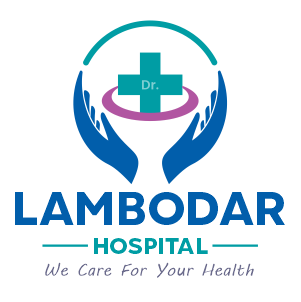Cardiologist in Waluj MIDC

What is Cardiology?
Cardiology is a specialized medical field dedicated to the diagnosis and treatment of heart and blood vessel diseases. Individuals with heart or cardiovascular conditions are often referred to a cardiologist for expert care. As a branch of internal medicine, cardiology focuses on managing various heart-related issues distinct from cardiac surgeons, who perform invasive heart surgeries involving chest openings. In Aurangabad, Lambodar Hospital stands out as a premier Cardiac Hospital, equipped with experienced cardiologists in Waluj MIDC who excel in diagnosing and treating heart-related ailments.
Cardiologists are proficient in conducting tests and procedures, including cardiac catheterization, angioplasty, and pacemaker implantation.
Heart disease specifically pertains to disorders affecting the heart, while cardiovascular disease encompasses conditions that can impact the heart, blood vessels, or both.
Cardiovascular System
The cardiovascular system plays a vital role in the body, facilitating the processing of oxygen and nutrients in the blood through a process known as coronary circulation. This system comprises coronary arteries and coronary veins.
Within the field of cardiology, numerous cardiovascular diseases have been extensively studied and treated. These include acute coronary syndrome, a condition that encompasses a wide range of symptoms associated with myocardial infarction. Other common diseases within this realm are angina pectoris, atherosclerosis, coronary artery disease, and restenosis. Cardiology’s broader categories of diseases cover various conditions such as cardiac arrest, myocardial or cardiomyopathy (including different forms of cardiomyopathy), pericardial diseases (including types of pericarditis), heart valve diseases (involving the aortic, mitral, pulmonary, and tricuspid valves), congenital heart defects (ranging from atrial septal defects to ventricular septal defects), and vascular diseases (including aneurysms, deep vein thrombosis, varicose veins, vasculitis, and other vascular disorders).
In the field of cardiology, various medical devices are utilized to aid in diagnosis and treatment. These devices include different types of balloons and defibrillators, pacemakers, and stethoscopes. Additionally, artificial hearts have been developed and researched within the domain of cardiology to address specific medical needs.
What is the role of cardiologists?
Cardiologists are experts in the detection, prevention, and treatment of cardiovascular diseases, which encompass a range of heart and vascular conditions. On our panel, we have experienced and skilled cardiologists in Waluj MIDC. Some of the specific diseases they focus on include:
- Heart attack
- Heart failure
- High blood pressure
- Arrhythmia (abnormal heart rhythm)
- Heart valve problems
- Heart infections
The cardiologist’s duties encompass:
- Conducting comprehensive physical examinations.
- Ordering a range of medical tests, including blood tests, Electrocardiograms (ECG), exercise stress tests, and cardiac imaging studies, to aid in the diagnosis process.
- Analyzing and interpreting test results to identify potential diseases or conditions in the patient.
- Tailoring and prescribing appropriate treatments based on the patient’s individual needs.
- Recommending lifestyle adjustments such as dietary modifications, weight management, stress reduction, and regular exercise to enhance heart health.
- Offering counseling and guidance to prevent heart disease and maintain overall cardiovascular well-being.
- Performing specific medical procedures like cardiac catheterization or cardiac pacemaker implantation when necessary for treatment.
- Referring patients to specialized cardiac surgeons or interventional cardiologists for advanced interventions or surgeries if needed.
Cardiologists perform various tests to assess heart health and diagnose potential issues:
- Electrocardiogram (ECG or EKG): Records the heart’s electrical activity.
- Ambulatory ECG: Monitors the patient’s heart rhythm during exercise or daily activities using small metal electrodes connected to the chest and a Holter monitor.
- Stress test: Measures changes in heart rate during rest and exercise to assess heart performance and detect conditions like pericarditis (inflammation around the heart).
- Cardiac catheterization: Involves a small tube placed near the heart to collect data, identify blockages, and obtain images of the heart’s function and electrical system. This technology is also used for treating conditions such as congenital heart defects, valve issues, and coronary artery diseases.
- Nuclear cardiology: Utilizes radioactive materials for non-invasive imaging of cardiovascular diseases and disorders.
- Echocardiogram: Provides an ultrasound image of the heart’s structure and surrounding area, revealing its functioning and measuring the cardiac output—the amount of blood pumped by the heart per minute.
Visiting a cardiologist is recommended under certain circumstances:
If a person experiences symptoms of heart disease, their primary doctor may refer them to a cardiologist. Consult our cardiologist in Waluj MIDC.
The symptoms that may indicate a potential heart problem include:
- Shortness of breath
- Dizziness
- Chest pain
- Heart rate or rhythm changes
- High blood pressure
Cardiologists can conduct tests to detect heart murmurs or abnormal heart rhythms.
Cardiologists specialize in treating various heart-related conditions, such as heart attacks, heart failure, and other heart problems. They are involved in decision-making processes related to heart surgeries, cardiac catheterization, angioplasty, and stent implantation.
Cardiologists can help treat a wide range of heart diseases, including:
- Atherosclerotic fibrillation
- Arrhythmias
- Congenital heart disease
- Coronary heart disease
- Congestive heart disease
- High cholesterol and triglycerides
- High blood pressure
- Pericardial disease
- Ventricular disease
It is advisable to see a cardiologist even if there are no symptoms under certain conditions. For instance, if there is a family history of heart disease or high cholesterol, if the individual is a smoker, has diabetes, or is beginning a new exercise regimen.
Women with preeclampsia may have an increased risk of heart disease during late pregnancy or menopause, making it essential to consult a cardiologist in such cases.
The reasons to choose Lambodar Hospital’s Cardiologists:
- Lambodar Hospital is a renowned Cardiac Hospital in Aurangabad, known for delivering top-notch treatment for heart-related conditions.
- The hospital boasts years of experience in performing various surgical procedures for different heart surgeries.
- If you are seeking a Cardiologist in Waluj MIDC, Lambodar Hospital is the ideal destination, offering specialized cardiologists proficient in diagnosing and treating cardiovascular diseases.
